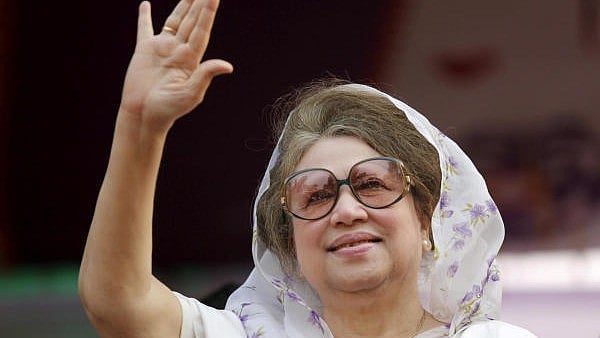
Former Bangladesh prime minister Khaleda Zia.
Credit: Reuters Photo
Dhaka: Former prime minister Khaleda Zia's BNP on Friday said it had no objection to the return of her deposed rival's party to politics under clean leadership, a day after Bangladesh interim government said it had no plans to ban it.
The Bangladesh Nationalists Party's (BNP) spokesman and senior joint secretary general Ruhul Kabir Rizvi's comments came on the day when at least two students' organisations of the Dhaka University held separate protests demanding a ban on Hasina's Awami League and its exclusion in the polls.
Rizvi told a party function in the capital, “If the person who would lead Awami League is not guilty of any crime, has not killed students, or misappropriated or laundered money abroad, why will the party not be able to do politics?” “We have nothing to say if the people accept Awami League after a quick trial of those involved in crimes committed by their regime,” Rizvi said but cautioned against the return of the autocratic rule in the country. “The democratic process and democratic exercise will fix one’s place in politics”.
Rizvi’s comments came a day after interim government chief Muhammad Yunus on Thursday told a delegation of the International Crisis Group that his administration “has no plans to ban the Awami League, but individuals within its leadership accused of crimes, including murder and crimes against humanity, would be tried in Bangladesh's courts”.
Yunus also said the government has not ruled out referring Awami League leaders to the International Criminal Court in The Hague following a UN fact-finding mission that reported potential crimes during the July-August 2024 protests that toppled Hasina's nearly 16-year regime. “It is very much on the table”.
Hasina has been living in India since August 5 last year, when she fled Bangladesh following a massive students-led protest that toppled her Awami League's 16-year regime.
Bangladesh's International Crimes Tribunal (ICT) has issued arrest warrants for Hasina and several of her former cabinet ministers, advisers, and military and civil officials for “crimes against humanity and genocide”.
“A trial will be taking place. Not only against her, but also all the people associated with her - her family members, her clients or associates,” Yunus had said earlier in the month.
Following Hasina's ouster, the leaders of the Students Against Discrimination (SAD), who led the violent protests, had demanded a ban on Awami League too while the BNP, at that time too, had opposed the idea saying they were not in favour of banning any party.
But a group of SAD leaders, who recently floated a political outfit, the National Citizen Party (NCP), said they did not want Awami League’s rehabilitation or election participation while they sought to establish a ‘Second Republic’ scrapping the country’s original 1972 constitution.
A key NCP leader Hasnat Abdullah, in a Facebook post earlier in the day, claimed that a “conspiracy is afoot to rehabilitate the Awami League” in the name of “refined Awami League at the behest of India”.
He claimed that a proposal for the refined version of Awami League was pitched to him and two others “by the (military) cantonment” on the afternoon of March 11 and “we were asked to accept this proposal in exchange for a seat-sharing agreement.” Jamaat-e-Islami, once a crucial partner of the previous BNP-led four-party alliance government, recently put its weight towards NCP on the Awami League issue with the JeL chief Shafiqur Rahman saying, “People won't accept rehabilitation of Awami League”. Meanwhile, two students’ organisations, the Bangladesh Democratic Students' Council (BDSC) and Inquilab Mancha, on Friday held separate protest marches demanding a ban on the Awami League and its exclusion from elections, newspaper Dhaka Tribune said here.